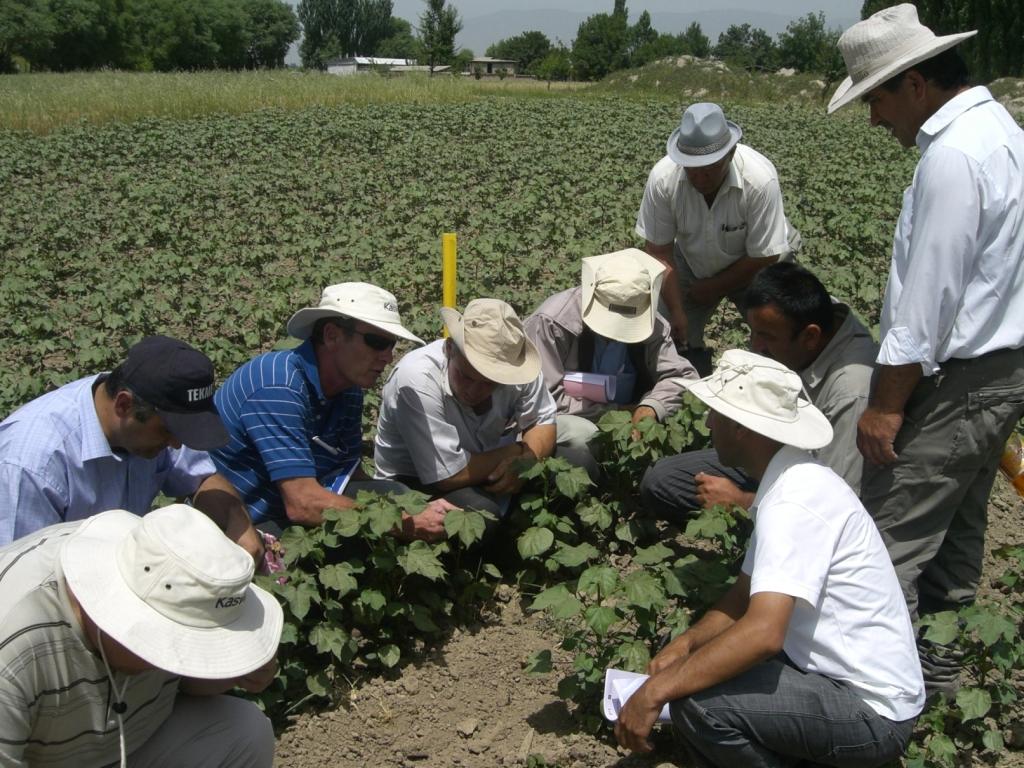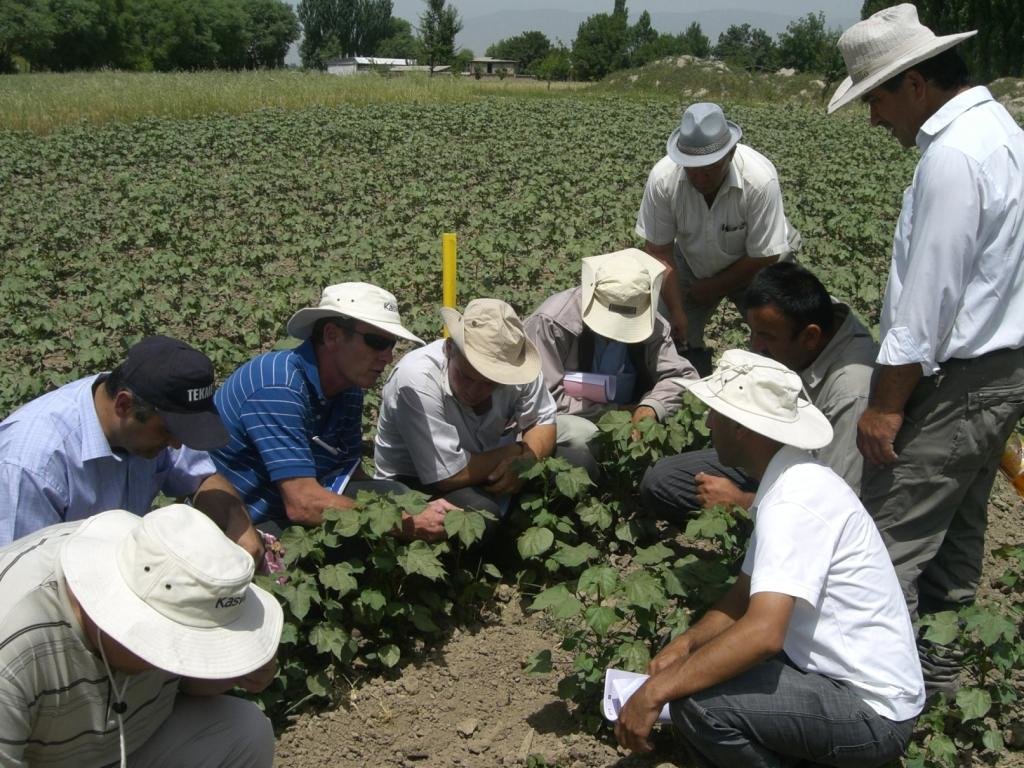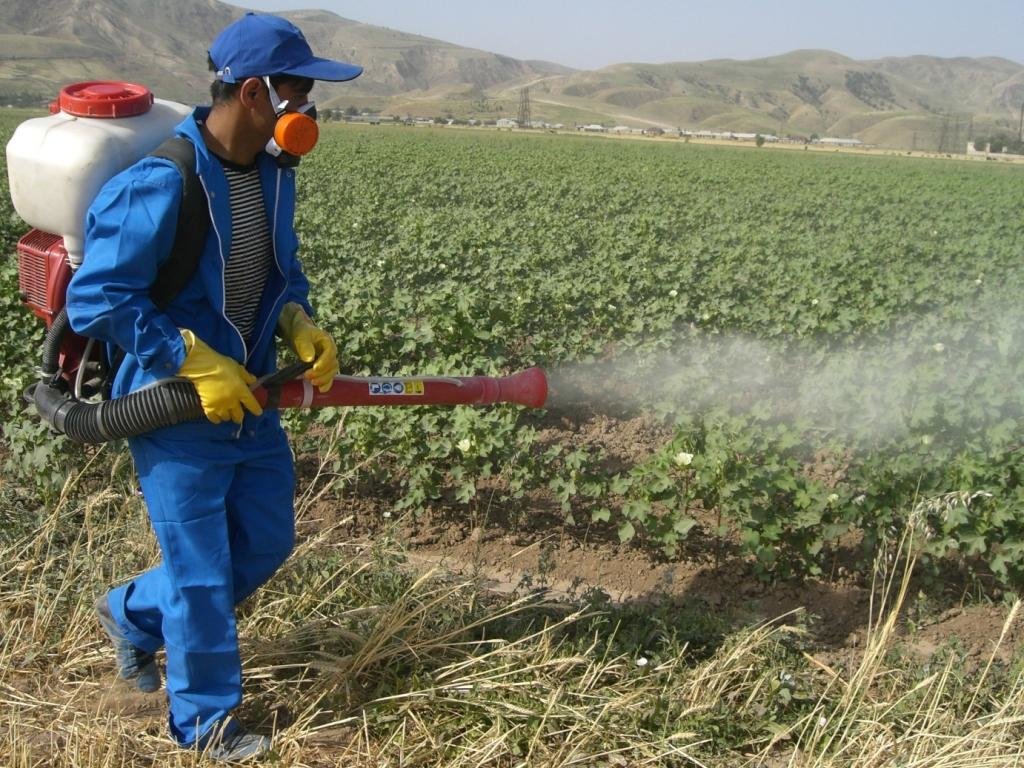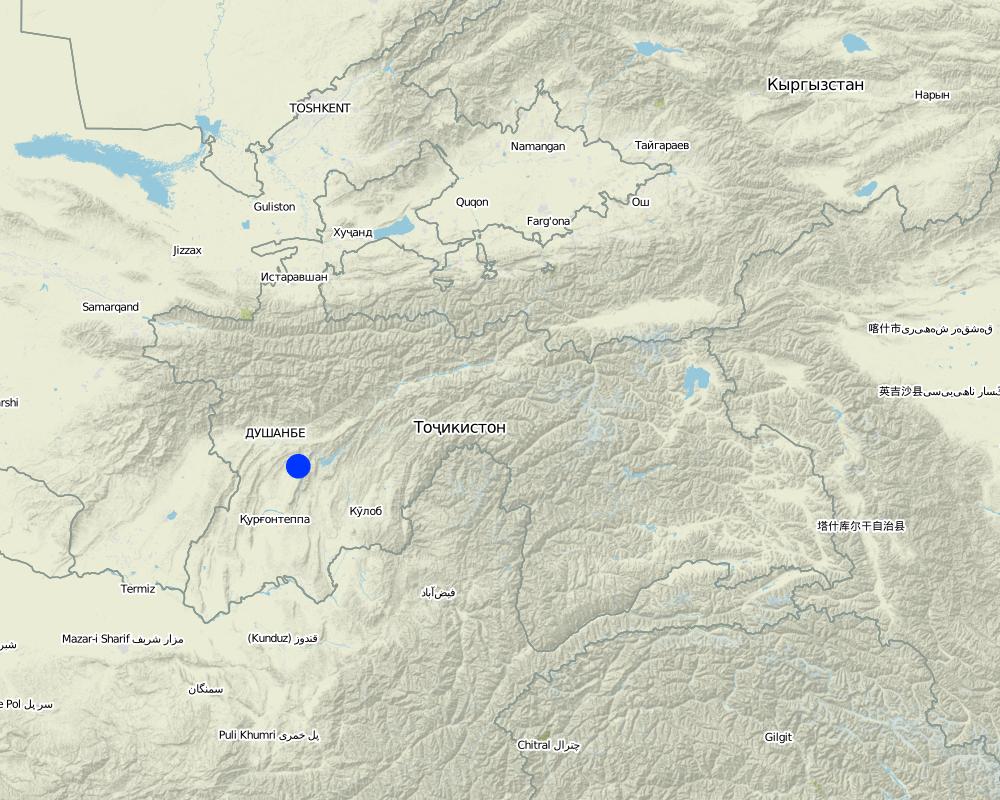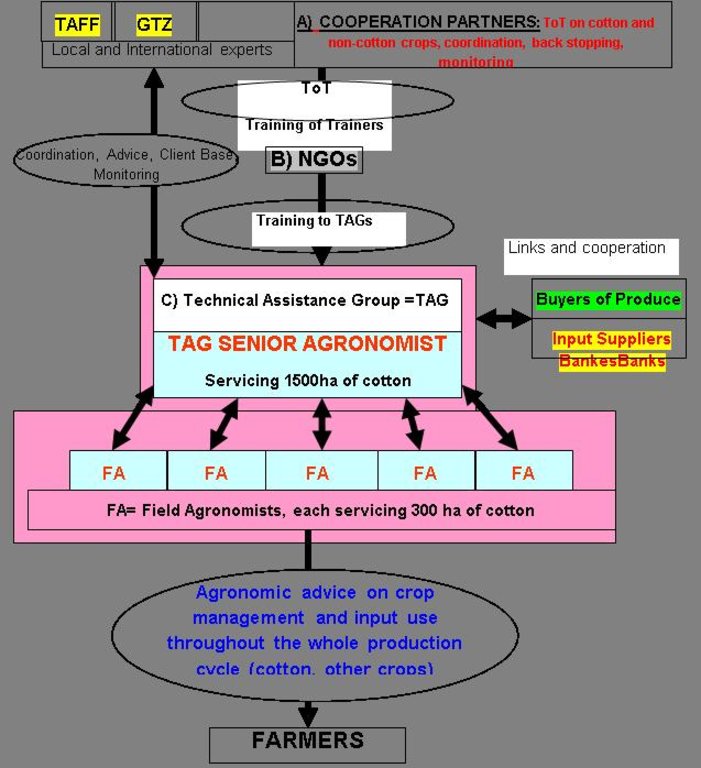Technical Assistance Groups (TAG) [ทาจิกิสถาน]
- ผู้สร้างสรรค์:
- การอัพเดท:
- ผู้รวบรวม: Philippe Zahner
- ผู้เรียบเรียง: –
- ผู้ตรวจสอบ: David Streiff, Alexandra Gavilano
approaches_2448 - ทาจิกิสถาน
ดูส่วนย่อย
ขยายทั้งหมด ย่อทั้งหมด1. ข้อมูลทั่วไป
1.2 รายละเอียดที่ติดต่อได้ของผู้รวบรวมและองค์กรที่เกี่ยวข้องในการประเมินและการจัดเตรียมทำเอกสารของแนวทาง
ผู้เชี่ยวชาญ SLM:
Weissen Hugo
hugoweissen@kaswag.com.au
ออสเตรีย
ผู้เชี่ยวชาญ SLM:
Kaelin Laurie
lauriekaelin@kaswag.com.au
ออสเตรีย
ชื่อของโครงการซึ่งอำนวยความสะดวกในการทำเอกสารหรือการประเมินแนวทาง (ถ้าเกี่ยวข้อง)
Deutsche Gesellschaft für Internationale Zusammenarbeit (GIZ) GmbH (GIZ) - เยอรมนี1.3 เงื่อนไขที่เกี่ยวข้องกับการใช้ข้อมูลที่ได้บันทึกไว้ผ่านทาง WOCAT
วันที่เก็บรวบรวมข้อมูล (ภาคสนาม):
20/05/2011
ผู้รวบรวมและวิทยากรหลักยอมรับเงื่อนไขเกี่ยวกับการใช้ข้อมูลที่ถูกบันทึกผ่านทาง WOCAT:
ใช่
2. คำอธิบายของแนวทาง SLM
2.1 การอธิบายแบบสั้น ๆ ของแนวทาง
Technical advisory groups working on a 'fee for service' basis provide an effective service to farmers to achieve measurable yield increases, based on regular crop monitoring, crop management advice and effective use of inputs (fertilisers, water, pesticides, etc.)
2.2 การอธิบายอย่างละเอียดของแนวทาง
การอธิบายอย่างละเอียดของแนวทาง:
Aims / objectives: The TAG concept is designed to achieve the following key objectives: (1) Provide an effective agronomic advisory service to farmers to achieve measurable yield increases, based on regular crop monitoring, crop management advice and effective use of inputs (fertilisers, water, pesticides, etc.), (2) Support the development of agricultural input supply and distribution, and (3) Operate as independent entities on a competitive 'fee for service' basis (fee per ha), working towards achieving self sustainability.
Methods: TAGs are the central component of the framework and follow a very simple operational structure, basically consisting of a “Senior Agronomist” (SA), a “Organisation Manager” (OM) and a defined number of “Field Agronomists” (FA). The SA will register an advisory business as well as the OM and FA. The cooperation will be regulated by cooperation contracts. The SA will engage directly into service contracts with farmer clients to whom they will provide crop management recommendations throughout the entire production cycles. TAGs will be based in defined geographic areas, operating with local staff (SA, OM, FA) and build up a customer base large enough for financial self sustainability.
Stages of implementation: (1) TAGs are registered as enterprises, (2) TAGs develop business plans, (3) TAGs develop work plans and field records, (4) each TAG signs contract with cooperation partners (TAFF and GIZ-PSD project), (5) TAGs get first payment from cooperation partners (555 USD per TAG), (6) TAGs sign consulting contracts for 500 ha, farmers pledge to pay for advisory service 24 TJS/ha in the whole season, (7) quality control of advisory contracts concluded: visit of contracted farms to ensure the farmers understand the TAG-system, (8) TAGs do market analysis for the regional availability of suppliers for pesticides, fertiliser etc., mechanisation contractors, banks, buyers, (9) second payment from cooperation partners, 5 TJS per ha up to 500 ha contracted area per TAG, (10) third payment from cooperation partners, same conditions as previous point, (11) fourth payment from cooperation partners, 12 TJS per ha contracted area (only if field advisors are contracted and have received first salary, first field records are made and filed to the TAG documentation), (12) first payment from clients/farmers, 12 TJS per ha contracted area, (13) second payment from clients/farmers, 12 TJS per ha contracted area, (14) fifth payment from cooperation partners, 5 TJS per ha contracted area (only if contracts are fully pay through clients, TAG must handover documentation of their work).
Role of stakeholders: Cooperation partners provide expertise and training, support to the organisational and sustainable development of TAGs and financial support. NGOs (Agricultural Extension Service Providers) will be invited to enter into contract agreements for the provision of training to TAGs. TAGs consist of a “Senior Agronomist” (SA), a “Organisation Manager” (OM) and a defined number of “Field Agronomists” (FA).
2.3 รูปภาพของแนวทาง
2.5 ประเทศ ภูมิภาค หรือสถานที่ตั้งที่ได้นำแนวทางไปใช้
ประเทศ:
ทาจิกิสถาน
ภูมิภาค/รัฐ/จังหวัด: :
Khatlon, Soghd, RSS
ข้อมูลเฉพาะเพิ่มเติมของสถานที่ตั้ง:
Yovon, Hissor, Vakhsh, Djomi, Konibodom, Zafar, Kuljob, Vose
Map
×2.6 วันที่เริ่มต้นและสิ้นสุดของแนวทาง
ระบุปีที่เริ่ม:
2011
2.7 ประเภทของแนวทาง
- ใช้โครงงานหรือแผนงานเป็นฐาน
2.8 เป้าหมายหรือวัตถุประสงค์หลักของแนวทาง
The Approach focused mainly on other activities than SLM (productivity increase)
The main objectives of the approach were to: (1) Provide an effective agronomic advisory service to farmers to achieve measurable yield increases, based on regular crop monitoring, crop management advice and effective use of inputs (fertilisers, water, pesticides, etc). (2) Support the development of agricultural input supply and distribution. (3) Operate as independent entities on a competitive 'fee for service' basis (fee per ha), working from the start towards achieving self sustainability.
The SLM Approach addressed the following problems: low agricultural production, lack of technical knowledge
2.9 เงื่อนไขที่เอื้ออำนวยหรือเป็นอุปสรรคต่อการนำเทคโนโลยีภายใต้แนวทางนี้ไปปฏิบัติใช้
การจัดตั้งระดับองค์กร
- เป็นอุปสรรค
weak capacity of governmental agricultural extension services
Treatment through the SLM Approach: establishment of independent agricultural extension services
ความรู้เกี่ยวกับ SLM การเข้าถึงการสนับสนุนด้านเทคนิค
- เป็นอุปสรรค
little or no access of farmers to effective agronomic technical assistance services
Treatment through the SLM Approach: establishment of technical advisory groups TAGs
3. การมีส่วนร่วมและบทบาทของผู้มีส่วนได้ส่วนเสียที่เกี่ยวข้อง
3.1 ผู้มีส่วนได้ส่วนเสียที่เกี่ยวข้องในแนวทางนี้และบทบาท
- ผู้ใช้ที่ดินระดับท้องถิ่นหรือชุมชนระดับท้องถิ่น
Entered contracts with TAGs to employ their advisory services
- ผู้เชี่ยวชาญ SLM หรือที่ปรึกษาการเกษตร
All senior agronomists are male. They were selected on the basis of their perceived experience and agronomy knowledge. Field agronomists were selected by their respective SA. Some of the field agronomists are female.
Received training provided by the cooperation partners (training of trainers)
- องค์กรพัฒนาเอกชน
AIN, ATAC and SAS Consulting (and other agricultural extension NGOs)
- องค์การระหว่างประเทศ
GIZ-PSD project, TAFF Tajik Agricultural Finance Framework (EBRD)
3.2 การเกี่ยวข้องของผู้ใช้ที่ดินระดับท้องถิ่นหรือชุมชนระดับท้องถิ่นในช่วงต่างๆของแนวทาง
| ความเกี่ยวข้องของผู้ใช้ที่ดินระดับท้องถิ่นหรือชุมชนระดับท้องถิ่น | ระบุผู้ที่มีส่วนเกี่ยวข้องและอธิบายกิจกรรม | |
|---|---|---|
| การริเริ่มหรือการจูงใจ | ไม่มี | |
| การวางแผน | ไม่มี | |
| การดำเนินการ | ไม่ลงมือ | the land users pay the TAGs for their services with a service fee |
| การติดตามตรวจสอบหรือการประเมินผล | ไม่มี | |
| Research | ไม่มี |
3.3 แผนผังแสดงขั้นตอนการทำงาน (ถ้ามี)
3.4 การตัดสินใจเลือกใช้เทคโนโลยี SLM
ระบุผู้ที่ทำการตัดสินใจเลือกเทคโนโลยีมากกว่าหนึ่งวิธีไปปฏิบัติใช้:
- ผู้เชี่ยวชาญ SLM เพียงผู้เดียว
การอธิบาย:
agricultural extension service to provide assistance to land users
Decisions on the method of implementing the SLM Technology were made by by SLM specialists alone (top-down)
4. การสนับสนุนด้านเทคนิค การสร้างขีดความสามารถ และการจัดการด้านความรู้
4.1 การสร้างขีดความสามารถ / การอบรม
ได้มีการจัดอบรมให้แก่ผู้ใช้ที่ดินหรือผู้มีส่วนได้ส่วนเสียคนอื่น ๆ หรือไม่:
ใช่
ให้ระบุว่าใครเป็นผู้ได้รับการอบรม:
- เจ้าหน้าที่ภาคสนาม / ที่ปรึกษา
รูปแบบการอบรม:
- technical advisory service
หัวข้อที่พูด:
Innovative approaches to crop management, effective use of agricultural inputs (fertilizers, pesticides, water, etc), basics of advisory work, cotton growing, modern ways of plant protection, cooperation with other service providers, improving the performance of the TAG team, and improving the TAG business were key focus points.
4.2 การบริการให้คำแนะนำ
ผู้ใช้ที่ดินมีการเข้าถึงการรับบริการให้คำปรึกษาหรือไม่:
ใช่
ระบุว่ามีบริการให้คำปรึกษาหรือไม่:
- ที่ศูนย์ถาวร
การอธิบาย/แสดงความคิดเห็น:
Technical Assisstance Groups (TAGs); Key elements: TAGs provide know-how on modern crop production and crop management techniques to individual farmer clients., TAGs establish links with input providers and buyers of produce, TAGs are financially self-sustainable through the service fee they collect from farmer clients
Advisory service is quite adequate to ensure the continuation of land conservation activities; The value of crop rotation to conservation and improvement of soil health is clear to the TAG. Problems associated with erosion and fertiliser leaching are being discussed in field training sessions.
4.3 การเสริมความแข็งแกร่งให้กับสถาบัน (การพัฒนาองค์กร)
สถาบันได้รับการจัดตั้งขึ้นมาหรือเสริมความแข็งแกร่งโดยแนวทางนี้หรือไม่:
- ใช่ อย่างมาก
ระบุระดับของสถาบันที่ได้รับการเสริมความแข็งแกร่งหรือจัดตั้งขึ้นมา:
- ท้องถิ่น
ระบุประเภทของการให้ความช่วยเหลือสนับสนุน:
- ด้านการเงิน
- การสร้างขีดความสามารถ / การอบรม
ให้รายละเอียดเพิ่มเติม :
The TAGs were registered as formal entities. They were supported by the coordination partners financially and through training sessions.
4.4 การติดตามตรวจสอบและประเมินผล
การติดตามตรวจสอบและประเมินผลเป็นส่วนหนึ่งของแนวทางหรือไม่:
ใช่
ความคิดเห็น:
economic / production aspects were regular monitored by project staff, land users through measurements; indicators: Measurement of yields by TAG and farmers, accumulation of data over time
area treated aspects were regular monitored by project staff, land users through observations; indicators: Approx. 17,000 ha being covered by TAG
area treated aspects were regular monitored by project staff, land users through measurements; indicators: Nearly 900 Dehkan Farms serviced
no. of land users involved aspects were regular monitored by project staff through observations; indicators: Communication between TAG, land users, input suppliers and project staff
management of Approach aspects were regular monitored by project staff through observations; indicators: gender of contracted farmers
socio-cultural aspects were regular monitored by project staff through observations; indicators: Measurement of yields by TAG and farmers, accumulation of data over time
economic / production aspects were regular monitored by project staff, land users through observations; indicators: Agronomic measurements of crop progress by TAG and project staff
technical aspects were regular monitored by project staff through measurements; indicators: Comprehensive collection of land use activities
technical aspects were regular monitored by project staff through observations; indicators: None
management of Approach aspects were regular monitored by None through measurements; indicators: None
There were several changes in the Approach as a result of monitoring and evaluation: Introduction of record keeping for field activities to serve as a decision making tool in the future. Introduction of systematic crop progress evaluations enabling much improved crop management. Communication between farmers and input suppliers is streamlined, with the expected outcome of improvements in quality and timing of input usage.
There were several changes in the Technology as a result of monitoring and evaluation: New tools introduced for record keeping and crop progress monitoring. Improvements in timing and quality of field activities (cultivation, fertilisation, irrigation etc). Improved access regarding timeliness and quality of production inputs.
4.5 การวิจัย
การวิจัยเป็นส่วนหนึ่งของแนวทางหรือไม่:
ใช่
ระบุหัวข้อเรื่อง:
- เศรษฐศาสตร์หรือการตลาด
ให้ข้อมูลเพิ่มเติมและให้ระบุผู้ทำการวิจัย:
Market analysis of regional availability of suppliers of pesticides, fertiliser etc., mechanisation contractors, banks, buyers.
5. การสนับสนุนด้านการเงินและวัสดุอุปกรณ์
5.1 ระบุงบประมาณประจำปีสำหรับแนวทาง SLM นี้
แสดงความคิดเห็น (แหล่งของการระดมทุน ผู้บริจาคคนสำคัญ):
Approach costs were met by the following donors: international (GIZ-PSD, TAFF): 20.0%; national non-government (TAGs): 80.0%
5.2 การสนับสนุนด้านการเงิน / วัสดุอุปกรณ์ให้แก่ผู้ใช้ที่ดิน
ผู้ใช้ที่ดินได้รับการสนับสนุนด้านการเงิน / วัสดุอุปกรณ์ไปปฏิบัติใช้เทคโนโลยีหรือไม่:
ใช่
ถ้าใช่ ให้ระบุประเภทของการสนับสนุน เงื่อนไขและผู้จัดหามาให้:
TAFF/GIZ-PSD project will provide a voucher to the senior agronomists to pay for additional NGO services, which they might need based on individual requirements. The voucher will cover 80% of the cost
5.3 เงินสนับสนุนสำหรับปัจจัยนำเข้า (รวมถึงแรงงาน)
- อื่น ๆ
| อื่นๆ (ระบุ) | เห็นด้วยระดับไหน | ระบุเงินสนับสนุน |
|---|---|---|
| Establishment of TAGs at the beginning | ได้รับการช่วยเหลือทางการเงินบางส่วน |
ความคิดเห็น:
During the initial establishment period of the TAGs they received 5 supportive payments. Those are either fixed amounts, or based on the number of hectares contracted by the TAGs
5.4 เครดิต
มีการจัดหาเครดิตมาให้ภายใต้แนวทาง SLM หรือไม่:
ไม่ใช่
6. การวิเคราะห์ผลกระทบและการสรุป
6.1 ผลกระทบของแนวทาง
ช่วยให้ผู้ใช้ที่ดินนำเอาเทคโนโลยี SLMไปใช้และบำรุงรักษาสภาพไว้ได้หรือไม่:
- ไม่ใช่
- ใช่ เล็กน้อย
- ใช่ ปานกลาง
- ใช่ อย่างมาก
In the longer term land users benefit from agronomic advise to improve sustainable land management (e.g. fertiliser use, irrigation efficiency, crop rotation).
ทำให้กลุ่มด้อยโอกาสมีอำนาจทางสังคมและเศรษฐกิจหรือไม่:
- ไม่ใช่
- ใช่ เล็กน้อย
- ใช่ ปานกลาง
- ใช่ อย่างมาก
Employment of male and female agronomists through TAG, partly funded by service receivers (farmers). Expected increases in land productivity as a result of advice will lead to higher farm income.
Did the Approach lead to improved livelihoods / human well-being?
- ไม่ใช่
- ใช่ เล็กน้อย
- ใช่ ปานกลาง
- ใช่ อย่างมาก
Employment of agronomists through TAG, is partly funded by the service receivers (farmers). Expected increases in land productivity as a result of this agronomy advice will lead to higher farm income.
Did the Approach help to alleviate poverty?
- ไม่ใช่
- ใช่ เล็กน้อย
- ใช่ ปานกลาง
- ใช่ อย่างมาก
Employment of male and female agronomists through TAG, partly funded by service receivers (farmers). Expected increases in land productivity as a result of advice will lead to higher farm income.
6.2 แรงจูงใจหลักของผู้ใช้ที่ดินเพื่อที่จะนำ SLM ไปปฏิบัติใช้
- การผลิตที่เพิ่มขึ้น
Farmers expect increased production as a result of agronomic advice
- กำไร (ความสามารถ) อัตราส่วนค่าใช้จ่ายต่อผลประโยชน์ที่เพิ่มขึ้น
Framers expect increased farm income as a result of agronomic advice
6.3 ความยั่งยืนของกิจกรรมของแนวทาง
ผู้ใช้ที่ดินสามารถทำให้สิ่งต่างๆ ที่ได้ปฏิบัติใช้โดยแนวทางนี้ยั่งยืนได้หรือไม่ (โดยไม่มีการสนับสนุนจากภายนอก):
- ไม่
ถ้าตอบว่าไม่หรือไม่แน่ใจ ให้ระบุและแสดงความคิดเห็น :
Land users rely on agronomic advice and on timely access to good quality inputs. TAGs, if successful, can provide a service to the farmer for which he/ she is prepared to pay for. TAGs if successful however, are expected to continue and grow their advisory services businesses and become self sustainable.
6.4 จุดแข็งและข้อได้เปรียบของแนวทาง
| จุดแข็ง / ข้อได้เปรียบของแนวทางในทัศนคติของผู้ใช้ที่ดิน |
|---|
| Quality agronomic advice (How to sustain/ enhance this strength: Ongoing training und upskilling of agronomists. Establishment of a strong core of agronomic advisors who themselves will train new agronomists as their advisory businesses grow) |
| จุดแข็ง / ข้อได้เปรียบของแนวทางในทัศนคติของผู้รวบรวมหรือวิทยากรหลัก |
|---|
| Systematic and professional approach to the provision of services (How to sustain/ enhance this strength: Ongoing training of TAGs and NGOs) |
| TAGs are registered service providers (How to sustain/ enhance this strength: Return clients, increase in client numbers) |
| Networking between TAGs and input suppliers (How to sustain/ enhance this strength: Facilitation and improvement of communication, training) |
7. การอ้างอิงและการเชื่อมต่อ
7.1 วิธีการหรือแหล่งข้อมูล
- ไปเยี่ยมชมภาคสนาม การสำรวจพื้นที่ภาคสนาม
- การสัมภาษณ์กับผู้ใช้ที่ดิน
ลิงก์และโมดูล
ขยายทั้งหมด ย่อทั้งหมดลิงก์
ไม่มีลิงก์
โมดูล
ไม่มีโมดูล


